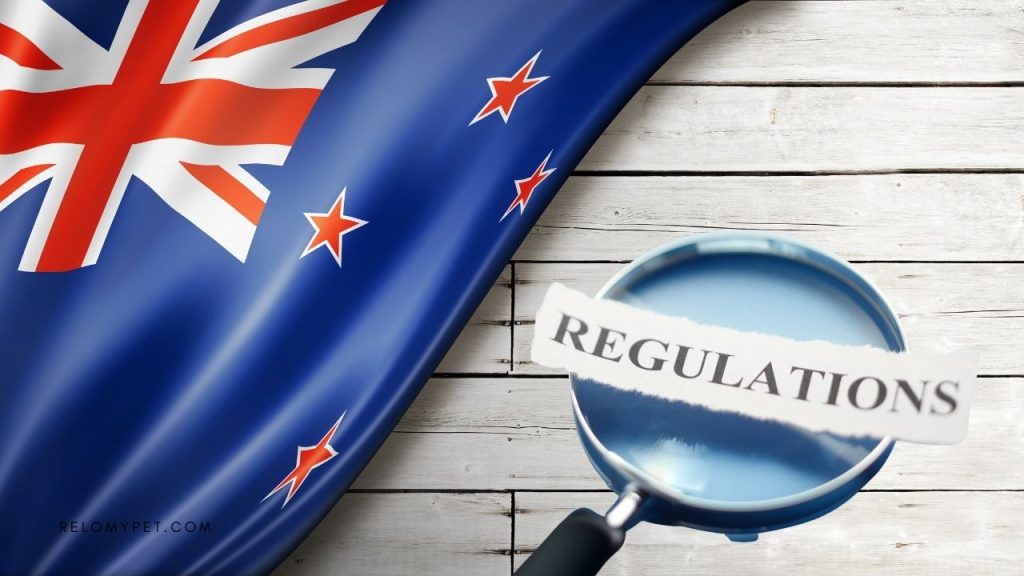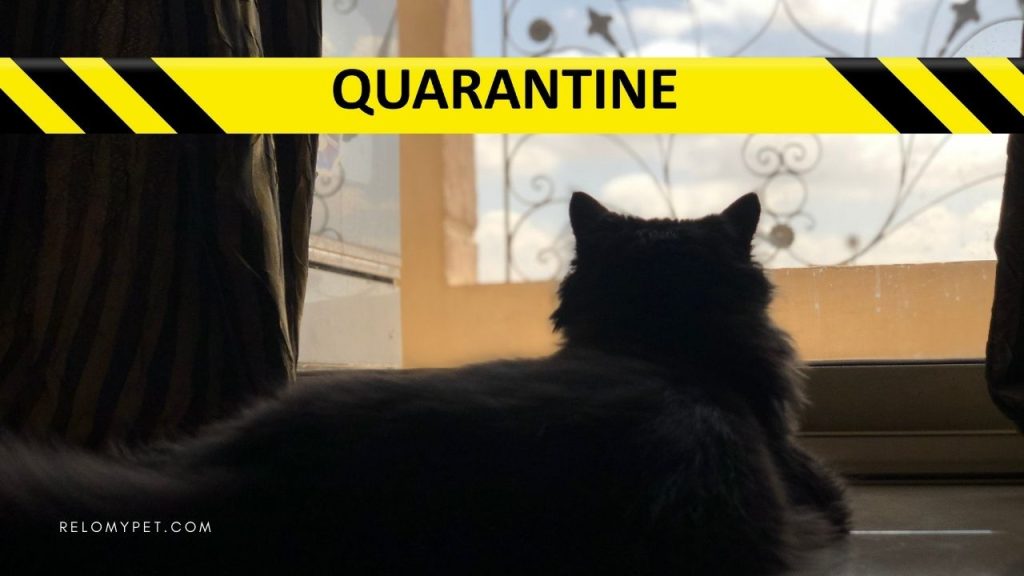Pet Relocation to New Zealand: A Comprehensive Guide
Table of Contents
The Process of Relocating Your Pet to New Zealand
Moving to a new country can be an exciting experience, and if you’re planning a move to New Zealand with your pets, you’ll want to ensure their travel is as smooth and stress-free as possible. Pet relocation to New Zealand involves a series of steps and requirements to comply with the country’s strict regulations. So, in today’s article, we’ll walk you through the essential steps for bringing pets to New Zealand, providing you with valuable information about New Zealand pet import regulations, quarantine requirements, vaccinations, and more. Let’s get started!
Can Cats and Dogs Move to New Zealand?
Yes, cats and dogs can move to New Zealand, but the process involves adhering to strict New Zealand pet import regulations and following a series of steps to ensure your pets can enter the country safely and legally. These requirements are in place to protect New Zealand’s unique environment and wildlife from potential diseases that may be brought in by animals.
Some of the requirements for importing cats and dogs into New Zealand include vaccinations, microchipping, blood tests, and a minimum of 10 days in quarantine. In addition, certain breeds of dogs are not allowed into the country, such as American Pit Bull Terriers, Dogo Argentinos, Fila Brasileiros, and Japanese Tosas.
It’s important to note that the process of importing pets into New Zealand can be complex and time-consuming, so it’s recommended to begin the process well in advance of the intended move. Consulting with a professional pet relocation service can also help ensure that all requirements are met and the move goes smoothly for both you and your furry friend.

Moving to New Zealand with Pets: 8 Tips You Need to Know
If you’re planning to move to New Zealand with your pets, there are several important tips to keep in mind to ensure a smooth and stress-free relocation for both you and your furry friends. Here are some tips on what needs to be done when planning to relocate with your pet to New Zealand.
Tip #1: Research New Zealand pet import regulations
Begin by familiarizing yourself with the New Zealand pet import regulations, as the country has strict biosecurity measures in place to protect its native wildlife. These regulations may include breed restrictions, so it’s crucial to verify if your pet’s breed is allowed entry into the country. If your dog is American Pit Bull Terrier, Dogo Argentino, Fila Brasileiro, or Japanese Tosa, you will not be permitted to bring them to New Zealand.

Tip #2: Arrange for New Zealand pet vaccinations and treatments
Your pet will need to be up-to-date with their vaccinations before relocating to New Zealand. Consult with your local government authority about the specific New Zealand pet vaccinations required, which may include rabies, distemper, hepatitis, parvovirus, and others.
Requirements
Here are some of the vaccinations and treatments that may be required for pets entering New Zealand:
Rabies Vaccination
Rabies is not present in New Zealand, so all dogs and cats entering the country must have proof of rabies vaccination. The vaccination must be given at least six months before entering the country.
Microchipping
All dogs and cats entering New Zealand must be microchipped for identification purposes. The microchip should be ISO 11784/11785 compliant and must be implanted before the rabies vaccination.
Internal and External Parasite Treatment
All dogs and cats entering New Zealand must be treated for internal and external parasites, including ticks and fleas, prior to departure. The treatment must be administered within a specified timeframe before travel.
Other Vaccinations
While not mandatory, it is recommended that dogs and cats receive additional vaccinations, such as for distemper, parvovirus, and kennel cough, before entering New Zealand.
It’s important to note that the specific requirements for vaccinations and treatments can vary depending on the country of origin of the pet, so it’s important to check with the appropriate New Zealand government agencies well in advance of travel to ensure that all requirements are met.

Tip #3: Obtain New Zealand pet health certificates
Once your pet is vaccinated, your veterinarian must issue a New Zealand pet health certificate. This document certifies that your pet is in good health and has received the necessary vaccinations.
What do you need to obtain a health certificate?
To obtain a pet health certificate for travel to New Zealand, there are a few steps you will need to take:
Consult with your veterinarian
Your first step should be to consult with your veterinarian, who can provide you with information on the specific requirements for pet travel to New Zealand. They can also perform any necessary vaccinations and treatments and advise you on how to prepare your pet for travel.
Contact the appropriate New Zealand government agency
The Ministry for Primary Industries (MPI) is the New Zealand government agency responsible for overseeing the importation of pets. Contact MPI to obtain the necessary forms and information for obtaining a pet health certificate. You may need to provide proof of your pet’s vaccinations, treatments, and other health records.
Schedule an appointment with an accredited veterinarian
To obtain a pet health certificate, you will need to schedule an appointment with an accredited veterinarian who is authorized to perform international pet health examinations. The veterinarian will examine your pet and fill out the necessary paperwork for the health certificate.
Submit the paperwork to MPI
Once the veterinarian has completed the examination and paperwork, you will need to submit the forms to MPI for review. They will review the paperwork and notify you if any additional information is needed.

Tip #4: Prepare New Zealand pet travel documentation
In addition to the health certificate, you’ll need to gather additional New Zealand pet travel documentation, such as a microchip certificate, a rabies blood test report, and any other documents required by the New Zealand authorities.
Required documents
There are several documents that are required for pets to travel to New Zealand:
Import Permit
All pets entering New Zealand must have an import permit, which is issued by the Ministry for Primary Industries (MPI). The import permit outlines the specific requirements for your pet’s travel and must be obtained prior to travel.
Health Certificate
A health certificate is issued by an accredited veterinarian and certifies that your pet has been examined and is in good health. The health certificate must be issued within a certain timeframe before travel and must meet the requirements set by MPI.
Vaccination and Treatment Records
You must provide proof of your pet’s vaccination and treatment history, including proof of rabies vaccination and treatment for internal and external parasites.
Microchip Information
All pets must have a microchip for identification purposes. You must provide information about the type of microchip and the microchip number.
Flight Details
You must provide information about your pet’s flight, including the flight number, airline, and arrival date and time.
Customs Declaration
You will need to complete a customs declaration form upon arrival in New Zealand. This form will ask for information about your pet, including their breed, age, and country of origin.

Tip #5: Comply with New Zealand pet quarantine requirements
New Zealand pet quarantine requirements mandate that cats and dogs must undergo a minimum of 10 days in quarantine upon arrival. Book your pet’s quarantine stay well in advance, as spaces can fill up quickly.
Main requirements
Here are some of the key requirements:
Pre-Quarantine
Pets must undergo a pre-quarantine period in the country of origin before traveling to New Zealand. The length of this period depends on the country of origin and can range from 30 to 180 days. During this time, your pet must undergo various tests and treatments to ensure they are free from diseases.
Quarantine Facilities
Upon arrival in New Zealand, pets must be taken to an MPI-approved quarantine facility. The quarantine period for dogs and cats is a minimum of 10 days, but can be longer if there are any health or behavioral concerns.
Health Checks
Pets are examined by a veterinarian upon arrival in New Zealand to ensure they are healthy and meet the country’s import requirements.
Microchip Verification
The microchip in your pet will be checked to ensure that it matches the information provided on the import permit and other travel documents.
Quarantine Fees
There are fees associated with the quarantine period, which must be paid by the pet owner.
Additional Requirements
Depending on the country of origin, there may be additional requirements for pets entering New Zealand, such as blood tests, quarantine periods in the country of origin, or additional treatments.

Tip # 6: Arrange for New Zealand pet transport regulations
Work with a professional pet relocation service to ensure that your pet’s travel complies with all New Zealand pet transport regulations, including the use of approved New Zealand pet travel carriers and adherence to airline requirements.
Main transport regulations
Here are some of the key pet transport regulations in New Zealand:
Travel Crates
Pets must be transported in an approved travel crate that meets specific size and ventilation requirements. The crate must be large enough for the pet to stand up, lie down, and turn around comfortably.
Airline Approval
The airline you choose must be approved by the New Zealand government to transport pets. This ensures that the airline meets the required standards for pet transport, such as appropriate handling procedures and temperature control.
Direct Flights
Pets must travel on direct flights to New Zealand whenever possible to minimize the amount of time they spend in transit.
Temperature Control
Airlines must provide appropriate temperature control during the flight to ensure that pets are not exposed to extreme temperatures.
Food and Water
Pets must have access to food and water during the flight, and the feeding and watering schedule must comply with New Zealand’s regulations.
Documentation
All required documentation, including import permits, health certificates, and vaccination records, must be provided to the airline prior to travel.
Notification of Arrival
The airline must notify MPI of the pet’s arrival at least 72 hours in advance of the flight’s arrival.

It’s important to note that the transport of pets can be stressful for both the pets and their owners, so it’s important to choose a reputable airline and prepare your pet for travel in advance. Working with a professional pet transport company can also help ensure that all regulations are met and your pet’s travel experience is as stress-free as possible.
Tip # 7: Plan for New Zealand pet-friendly accommodations, transportation, and attractions
Once you arrive, ensure that you have arranged for New Zealand pet-friendly transportation and accommodations, and familiarize yourself with local pet-friendly attractions to make your pet’s transition as enjoyable as possible.
Accommodations
Before you travel, research pet-friendly accommodations in the areas you plan to visit. Many hotels, motels, and vacation rentals in New Zealand are pet-friendly, but it’s important to check their policies and any additional fees that may apply. You can also consider booking through websites that specialize in pet-friendly accommodations, such as BringFido or PetsWelcome.
Transportation
When traveling with your pet, it’s important to consider transportation options that can accommodate your pet. If you plan to rent a car, make sure the rental company allows pets in their vehicles. Some public transportation options, such as buses and trains, may also allow pets, but it’s important to check their policies in advance. Alternatively, you can consider hiring a pet-friendly taxi or car service.
Attractions
Many outdoor attractions in New Zealand are pet-friendly, such as hiking trails, beaches, and parks. However, it’s important to check the specific rules and regulations for each attraction in advance. Some indoor attractions, such as museums and restaurants, may not allow pets, so it’s important to plan accordingly and make arrangements for your pet if necessary.
Pet Services
Consider researching pet services in the areas you plan to visit, such as veterinary clinics, pet stores, and pet-friendly cafes. This can be especially important if you need to purchase food, supplies, or medication for your pet while you’re traveling.

Tip # 8: Follow New Zealand pet travel restrictions and safety tips
Be aware of any New Zealand pet travel restrictions, such as leash laws, and follow pet travel safety tips to ensure your pet remains safe and comfortable throughout their journey. It’s important to take precautions to keep your pet safe during travel.
Safety tips
Here are some safety tips to keep in mind:
Identification
Make sure your pet has identification tags with your contact information, as well as a microchip with up-to-date information.
Comfort
Make sure your pet is comfortable during travel, with access to food, water, and a comfortable crate or carrier.
Exercise
Give your pet plenty of exercise before and after the flight to help reduce stress and anxiety.
Medications
If your pet requires medication, make sure to bring it with you and administer it according to your veterinarian’s instructions.

Pet Relocation Services to New Zealand Pros
Knowledge & Experience
To simplify the process of bringing pets to New Zealand, consider working with a reputable pet relocation company. Pet relocation services have extensive knowledge and experience with the regulations and requirements involved in pet travel to New Zealand. They can guide pet owners through the entire process, from obtaining the necessary documents to arranging transportation and quarantine. They can also take care of all the details involved in pet travel, including arranging transportation, booking pet-friendly accommodations, and ensuring compliance with all regulations. This can save pet owners time and reduce stress.
Customized services
Pet relocation services usually provide customized services tailored to the specific needs of each pet and owner. This can include personalized care during transit, assistance with special needs pets, and advice on the best pet-friendly activities and accommodations.
Stress-free relocation
And if your pet’s safety and your peace of mind are important to you, then pet relocation services are something you need. Knowing that your pets are in good hands and all requirements are being met will make the moving experience less stressful and more enjoyable. Pet transportation specialists will ensure that the entire process is as smooth and stress-free as possible so that pets can arrive safely and comfortably in their new home.

FAQ about pet relocation to New Zealand
To bring a pet to New Zealand, you must meet all of the country’s strict biosecurity requirements. This includes obtaining an import permit, completing a series of health checks and vaccinations for your pet, and ensuring that your pet undergoes quarantine upon arrival in the country.
The length of the quarantine period for pets in New Zealand can vary depending on the country of origin and the animal’s health status. Dogs are typically required to undergo a 10-day quarantine period, while cats are not required to undergo quarantine unless they come from a non-rabies-free country.
Yes, New Zealand has a list of banned dog breeds, including the American Pit Bull Terrier, the Dogo Argentino, and the Japanese Tosa. It’s important to check the list of banned breeds before bringing a dog to New Zealand.
It’s recommended that you start the process of relocating your pet to New Zealand at least six months before your planned departure date. This will allow enough time to complete all of the necessary health checks, vaccinations, and quarantine requirements.
If your pet is found to be carrying any pests or diseases during the quarantine process, it may be required to undergo further testing and treatment. This can be costly and time-consuming, so it’s important to ensure that your pet is healthy before beginning the relocation process.
Yes, you can travel around New Zealand with your pet, but it’s important to be aware of the country’s outdoor recreation rules, which may require dogs to be leashed or kept under control in certain areas. It’s also important to respect any areas where dogs are not allowed, such as certain beaches during nesting season.
Yes, it is possible to bring other types of pets to New Zealand, but the requirements and restrictions may differ from those for dogs and cats. It’s important to research the specific requirements for your type of pet before beginning the relocation process.
Moving to New Zealand? Contact Relopet International
Relocating your pets to New Zealand can be a complex and daunting process, but with Relopet International, you can have confidence that your furry family members are in good hands. Our team of experts is committed to providing the best pet relocation services to New Zealand, making the transition as smooth and stress-free as possible for both you and your pets. If you’re considering bringing pets to New Zealand, reach out to Relopet International today to get started on planning the perfect journey for your beloved companions.
